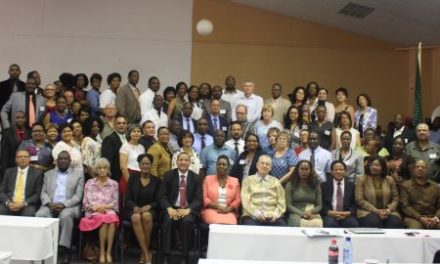
Officials meet to discuss School Food Programme
“As you may all know, the Ministry of Education receives the highest share of the national development budget. A proportion of this budget goes into ensuring that school learners receive a nutritious meal at school every school day in order to enhance access and performance,” said Alfred Ilukena, the Permanent Secretary in the Ministry of Education when he addressed a meeting of ministry officials and World Food Programme officers.
The Ministry of Education in collaboration with a World Food Programme team last week hosted a 3-day workshop on the Namibian School Food Programme, where all hostel officers and inspectors gathered to validate the ministry’s new revised Food Manual and newly developed monitoring and evaluation system for the programme.
The workshop is in line with recommendations made earlier in the case study. With the new monitoring and evaluation system, the Ministry of Education hopes to improve the efficiency and effectiveness of the programme.
The workshop was also attended by officials from the Ministry of Health and Social Services, the Ministry of Agriculture,Water and Forestry, the Ministry of Gender Equality and Child Welfare, and the National Planning Commission.
Ilukena said the government is committed to reaching the Millenium Development Goals including MDG2 which is to ensure that every child will be able to complete a full course of primary school by 2015. The government has already taken steps to achieve this goal, with the implementation of free primary education in January this year.
He said, in order to sustain the financial commitments to the school feeding programme, his ministry is required to demonstrate the benefits this programme has on the children, communities and the nation as a whole. And in addition, Ilukena maintained that citizens require proper accountability for the resources invested in the school feeding programme.
“Our decisive focus on Monitoring and Evaluation is even more important in order to demonstrate the impact of the School Food Programme. In 2012, with the assistance of the World Food Programme and its partners, the ministry carried out a study to review the operational aspects of the Namibian School Food Programme,” he said.
Ilukena added that the results of this study highlighted some inefficiencies in the implementation of the programme including a total lack of systems for monitoring and data collection and analysis. Making matters worse, it was discovered that the system depended on outdated school feeding guidelines.
He said, the efforts made by the education ministry to address this gap is a clear indication of its commitment to improve and be accountable and transparent to its stakeholders.
He further said the establishment of the programme’s Monitoring and Evaluation System will lead to a controlled monitoring of the utilization of resources allocated for school feeding and will also be a source of information for decision-making and budgetary resource allocations to the various areas of the programme.
He pointed out that attaining the school feeding objectives as set out in the National School Feeding Programme’s manual and M&E system, by the year 2017 will only be possible if the implementation of school feeding is properly tracked and guided through regular and well-targeted reporting of progress at every level.
“It is for this reason that the National School Feeding Programme’s M&E system is expected to play a pivotal role to ensure that performance is measured, reported on and directed accordingly. As such, your role as the Ministry of Education officers is very vital in ensuring the success of the school feeding programme. This is a responsibility which calls for more dedication and commitment,” he said.
“We are all aware of delays in the process of reporting on the school feeding outputs at all levels of implementation. These delays which are sometimes due to bureaucratic processes, lack of clear reporting guidelines and lack of systems to facilitate reporting, have sometimes resulted in tremendous delays in the annual budgeting and planning of food orders. The newly developed system will help address most of these challenges if it is adopted and used efficiently,” he added.
Ilukena also thanked the World Food Programme team for organising the workshop and acknowledged their support in the development of a Monitoring and Evaluation Plan and Guidelines for the Namibian School Food Programme.
“The Ministry of Education truly appreciates your contribution in moving the feeding programme forward and strengthening its M&E capacity for school feeding,” he said.











































